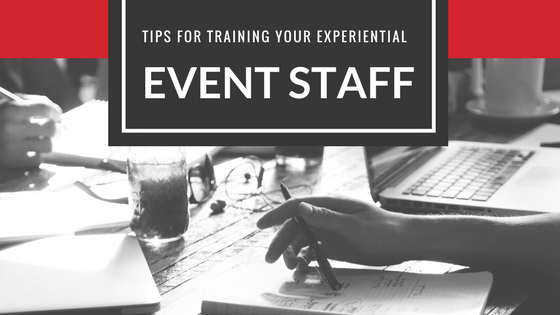03.02.18
By Lisa Major


Gone are the days of when event marketing consisted of a simple smile and handing a sample or a coupon to a passerby. Now, we have immersive experiences, brand messaging, leads to collect, digital elements, and questions to answer. Yet, one of the biggest mistakes that brands make when planning an experiential marketing event is not thinking about how they will train their brand ambassadors or promotional staff or if they will train them at all.
Having poorly trained or untrained staff on-site can crush event ROI. Consumers are very savvy in this digital world that we live in. Having access to information at our fingertips means that consumers can research a brand in a matter of seconds. But we don’t want a consumer on their phone at an activation trying to research a brand, we want them to learn about the brand from another human being. Why? Because experiential marketing is all about making real-life connections, engaging the senses, and providing stimulating experiences for the consumer.
With event staff being on the front lines of an activation, they are the ones who are responsible for drawing in consumers and establishing relationships. They are the driving force behind creating a positive and memorable experience. If the staff seem confused or can’t answer basic questions, it will turn people off which can be detrimental to the success of the event. No matter what the event entails, even if it’s just a basic sampling campaign, staff training is a must.
You may be asking yourself how in the world you are going to train a team that is 1200 miles away and while that is a valid question, don’t overthink it. There are many different methods and approaches that you can use to effectively train your event staff.
Keep in mind you don’t have to stick to one resource. Depending on the scope of your event and your staff roles, you may need to incorporate multiple resources to train your event staff.
Training materials don’t need to be 100-page documents. Cover the main points that you feel are the most important and present them in a clear and concise manner. No matter what your activation entails or how large or small your event is, there are 9 topics that should always be included in event staff training.
Communicate the history, products and/or services offered, as well as the personality of the brand so the team understands who the brand is, what they do, and how they present themselves to consumers.
Relay the purpose and the goals of the event so the team knows what the expectations are, and make sure they understand how they can help you reach those goals.
List all key talking points that you want the team to convey to consumers. Cover frequently asked questions and best practices for relaying your messaging.
If you have any technical elements like mobile apps, photo booths, or digital activities, you’ll need to cover the operational instructions for those elements. This is where online videos can come in handy.
Include photos, illustrations, or diagrams of the event footprint and event flow. If you don’t have a dedicated footprint or are activating a street team, include routing information with addresses, landmarks, or cross streets.
Be specific when providing appearance and uniform requirements – from head to toe. What type of black pants – dress pants, yoga pants, casual pants? What color sneakers? Do you want tattoos covered, piercings removed? Include a photo or illustration of the uniform if you can.
Be as detailed as possible when explaining what the team will be doing, where they are doing it, and your expectations. Additionally, go over what not to do (chew gum, have their phone out, talk about sensitive issues, etc.).
Discuss where to meet, where to park, check-in/check-out procedures, on-site contact information, break schedules, etc.
Always have a plan. Make sure your team knows what to do in the event of an emergency.
There will most likely be other subjects that you will need or want to cover, but by giving your event staff or your staffing company the information listed above, you are well on your way to having a capable and competent event team.
Do consider partnering with event staffing experts to hire and manage your brand ambassadors or promotional team. A staffing agency will have the knowledge and experience to effectively facilitate training and testing for an event. They can also give you advice on what to include in the training materials.
Don’t be afraid to ask for help.
Do give yourself or your event staffing company plenty of time source, recruit, and onboard your event team. This will leave you with more than enough time to train your staff.
Don’t wait until the last minute to hire your event staff.
Do offer plenty of opportunities for your staff to get to know your brand, your products, and your services, and compensate them for their time (flat rates work well for training).
Don’t assume that they will invest in the time to learn about your brand without being paid for their time.
Do include staff training in your initial budget so there are no surprises. Consider the cost of training materials, compensation for the staff or staffing agency rates, venue cost for in-person training, etc.
Don’t try and save a buck on your event’s most important asset – the people.
Do offer training materials or sessions that are highly engaging. Include visual elements, team-building exercises, and Q&A discussions. Always aim to get the team to interact with one another.
Don’t give a boring 30 – minute training call reading a training document verbatim.
Do test your staff on the key training points to ensure that they are fully prepared. Offer online testing or consider trivia style group games to make the testing more fun.
Don’t assume that the team is ready just because you gave them a training document.
Whatever your experiential marketing campaign entails, always include at least one form of training for your staff. After all, when it comes to connecting your brand with your consumer, your staff is your most valuable resource. By properly training your experiential event staff, you will be setting your event up for success.
Since 2002, ATN has been a leader in the experiential marketing event staffing industry. We understand the importance of having properly trained event staff and we go the extra mile to ensure that our brand ambassadors are ready for their events. Our clients have peace of mind knowing that our staff is equipped with the knowledge and experience to connect with consumers through authentic, engaging and meaningful conversations.